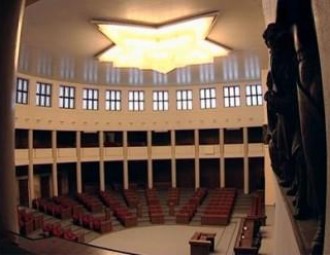Opinion: Lukashenka may create a mix of conservatives and reformists in the new government

On 20 September Lukashenka stated he knew who was going to enter the new government. The previous government resigned, under Belarus law, after Lukashenka's victory in the October president election.
The new composition of the government will expose the state ruler's agenda and on whom he relies. On the one hand, a new elite has appeared that resembles those in Belarus' European counterparts. On the other hand, the older nomenklatura still has great influence.
A few ministries and government officials want change, at least in order to perform their job effectively. Others remain interested in business as usual.
European-style nomenklatura vs. Soviet-style nomenklatura?
Over the past few years, new people have received top positions within the regime. This part of the Belarusian nomenklatura resembles European elites. It has more connections to the West, as these people previously studied or had job experience there. Many of them have a liberal economic stance, remain more open to independent media and are sympathetic to assertions of national identity. Two examples roughly reflect the new class.
Kiryl Rudy was appointed economic adviser to Aliaksandr Lukashenka in 2013. Before that he was a Fulbright Scholar in the United States, and worked as a lecturer and an economic counsellor in the Belarusian Embassy in China. This year, he gained a media profile with an article which called for structural reforms in the Belarusian economy. What’s more, his articles always quote Western mainstream economists.
Vasil Maciusheuski previously led BPS-Sberbank, one of the largest private banks in Belarus, and studied at the London Business School. In 2014 he became the first deputy prime minister. According to the traditional state hierarchy, Maciusheuski comes in as the fourth most important person in the country. In his student years Maciusheuski wore clothes with a Pahonia coat-of-arms, the national symbol often associated with the Belarusian democratic movement.
This class of people differs from the traditional nomenklatura, as they lack prejudices about the West and are quite young. Rudy is 37 years old and Maciusheuski 46. Both received top jobs in the elite largely due to Lukashenka's disappointment with the older nomenklatura, which appeared unable to rule the country in a crisis situation when financial resources were limited.
Despite the popularity of a new class of nomenklatura in the media, most officials have more similarities with Aliaksandr Lukashenka. They remain inconspicuous, but in practice they form the backbone of the Belarusian nomenklatura and appear in the media only in the context of scandals surrounding the president's work. The old nomenklatura elite are rarely engaged in creative work, and instead repress citizens and public institutions.
Mariana Shchotkina, Minister of Labour and Social Protection, moved to Belarus only after finishing her studies in St. Petersburg. She headed the campaign headquarters of Aliaksandr Lukashenka during the recent presidential election. She differs from the usual people engaged in social protection: she does not defend ordinary people, but attacks them. She advises the retired not to complain about low pensions, regrets that 93% of Belarusians have only one job, considers $10 unemployment benefits as normal and strongly defends the law on "social parasitism", according to which unemployed people should pay tax for being unemployed.
When Lukashenka dismissed Leanid Huliaka from the post of Minister of Culture, he promised to find him a job where he would fulfill his potential better. In 2005, Leanid Huliaka, now 66, who graduated from the Party School of the CPSU in Soviet times, became a Commissioner for Religions and Nationalities. In this post he has tried to prove that Poles experience no problems in Belarus, and that the Independent Union of Poles does not exist. Huliaka also has a tense relationship with the Catholic Church and accuses foreign clergy of being politically active.
How reforms divide the nomenklatura
As Aliaksandr Lukashenka stated on 20 October, "now it seems impossible to carry on in the old way". So that creates a demand for new faces. On the one hand, the structures that are most in favour of change already look more Westernized. These are the National Bank and parts of the government, which essentially counts the money, such as the Ministry of Finance. The Ministry of Foreign Affairs, which understands global trends better due to its work, also seems more pro-reform.
On the other hand, a few officials want business to stay as usual. The state concerns and several ministries as the Ministry of Commerce, remain best placed for those who want to increase government spending and have more competencies in the own hands. For example, the Ministry of Commerce usually uses licencing as a tool of repression and closed down several shops in 2015.
There’s an inert part of the regime that, basically, does not oppose changes but does not promote them either. These are ministries and local government officials who want, for example, foreign investment, but seem reluctant to attract these investments on their own.
Who will get jobs in the government?
Lukashenka faces a dilemma in choosing people for the new government. On the one hand, he has to thank his conservative loyalists for the support during the presidential campaign. That explains why such persons as Mariana Shchotkina may receive high positions - if not in the government, maybe in the Presidential Administration.
On the other hand, Lukashenka understands that his loyalists may further damage the Belarusian economy, which remains in desperate need of reform. So, reformists like Vasil Maciusheuski may save their positions. If Lukashenka wants reform, he will also give more portfolios to the European-style nomenklatura -- if not to reform, then at least to charm the International Monetary Fund or the European Union.
Taking this dilemma into account, Lukashenka may create a mix of conservatives and reformists. Currently he needs both to preserve his position.
Originally published at BelarusDigest
-
03.01
-
07.10
-
22.09
-
17.08
-
12.08
-
30.09








































